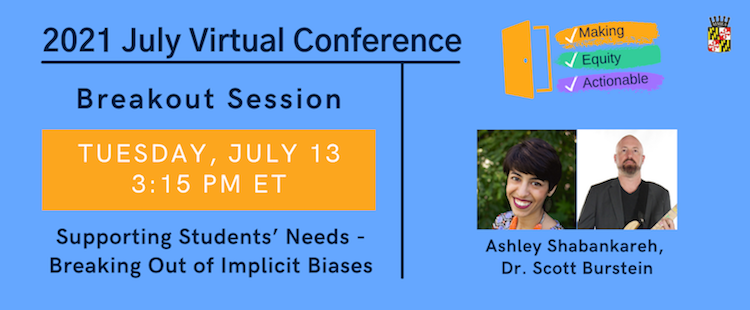
Breaking Out of Our Implicit Biases
Inequity in education has come to the forefront during the pandemic, especially with the sudden pivot into the digital landscape. While some schools focused on how to reimagine their pedagogy in an online space, numerous schools had to navigate technology disparities for both their students and teachers, which included lack of access to both devices and internet in their households. Faced with this dilemma, many ensemble teachers went to the familiar, looking for traditional western theory and history lectures to fill the void instead of taking it as an opportunity to take stock of advances in music technology and culture and reach their students by facilitating lessons about their culture and experience. As teachers move back towards in person instruction, what lessons have they learned about how to best reach all students?
This workshop is centered around the belief that by building on your students personal knowledge, passions, and experiences, music education can become more inclusive and equitable for all. We will begin by working with participants to examine our own musical biases through an intersectional lens, including ethnicity, gender, sexuality, and worth. The presenters will then make observations about their own work as teachers and employees of non-profit organizations, noting changes of perspective, especially as we’ve navigated twin pandemics of COVID-19 and systemic racism. Participants will then take these examples and work in groups to discuss how they might address lesson planning, classroom management, and creating a change in their schools, districts, and communities.
Learn more and join by visiting: https://jazzednet.org/summer/
Use the promo code “bias” for $5 off.

Radically Healing in the Post-Pandemic Classroom
From the COVID-19 pandemic to the continual impacts of systems of white supremacy, educators have seen firsthand the impacts the past year alone has had on the health and wellbeing of our students. As we begin to return back to our in-person classrooms, how can we help build hope and optimism for our students in the midst of oppression?
This workshop will focus on tactics to help our students radically heal, improving outcomes for our students and facilitating positive development as we return to in-person learning. Participants will learn about how their identities and wellness can impact their work, and will learn strategies to improve equity. In addition, participants will engage in elements of healing centered engagement, looking at ways to foster the well-being of our students in our classrooms and beyond.
Learn More by visiting: https://www.littlekidsrock.org/mbsummit/

Breaking Out of Our Implict Biases
Inequity in education has come to the forefront during the pandemic, especially with the sudden pivot into the digital landscape. While some schools focused on how to reimagine their pedagogy in an online space, numerous schools had to navigate technology disparities for both their students and teachers, which included lack of access to both devices and internet in their households. Faced with this dilemma, many ensemble teachers went to the familiar, looking for traditional western theory and history lectures to fill the void instead of taking it as an opportunity to take stock of advances in music technology and culture and reach their students by facilitating lessons about their culture and experience. As teachers move back towards in person instruction, what lessons have they learned about how to best reach all students?
This workshop is centered around the belief that by building on your students personal knowledge, passions, and experiences, music education can become more inclusive and equitable for all. We will begin by working with participants to examine our own musical biases through an intersectional lens, including ethnicity, gender, sexuality, and worth. The presenters will then make observations about their own work as teachers and employees of non-profit organizations, noting changes of perspective, especially as we’ve navigated twin pandemics of COVID-19 and systemic racism. Participants will then take these examples and work in groups to discuss how they might address lesson planning, classroom management, and creating a change in their schools, districts, and communities.
Learn more by visiting: https://www.mmea-maryland.org/2021-july-virtual-conference-schedule/#Tuesday